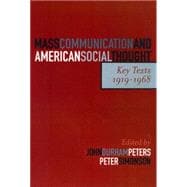
Note: Supplemental materials are not guaranteed with Rental or Used book purchases.
Purchase Benefits
What is included with this book?
| Introduction: Mass Communication and American Social Thought: Key Texts, 1919--1968 | 1 | (12) | |||
|
|||||
|
13 | (8) | |||
|
21 | (4) | |||
|
|||||
|
25 | (5) | |||
|
|||||
|
30 | (1) | |||
|
|||||
|
31 | (4) | |||
|
|||||
|
|||||
|
35 | (1) | |||
|
|||||
|
36 | (6) | |||
|
|||||
|
42 | (5) | |||
|
|||||
|
47 | (4) | |||
|
|||||
|
51 | (7) | |||
|
|||||
|
58 | (16) | |||
|
|||||
|
|||||
|
74 | (17) | |||
|
|||||
|
|||||
|
79 | (12) | |||
|
91 | (4) | |||
|
|||||
|
95 | (3) | |||
|
|||||
|
|||||
|
98 | (4) | |||
|
|||||
|
102 | (4) | |||
|
|||||
|
106 | (4) | |||
|
|||||
|
110 | (6) | |||
|
|||||
|
|||||
|
116 | (2) | |||
|
118 | (6) | |||
|
|||||
|
124 | (4) | |||
|
|||||
|
|||||
|
128 | (6) | |||
|
|||||
|
|||||
|
134 | (2) | |||
|
|||||
|
136 | (3) | |||
|
|||||
|
|||||
|
|||||
|
|||||
|
|||||
|
|||||
|
|||||
|
|||||
|
|||||
|
|||||
|
139 | (18) | |||
|
|||||
|
157 | (9) | |||
|
|||||
|
166 | (8) | |||
|
|||||
|
174 | (6) | |||
|
|||||
|
180 | (2) | |||
|
|||||
|
|||||
|
182 | (6) | |||
|
|||||
|
|||||
|
188 | (18) | |||
|
|||||
|
206 | (4) | |||
|
|||||
|
210 | (5) | |||
|
|||||
|
215 | (3) | |||
|
|||||
|
218 | (4) | |||
|
|||||
|
222 | (2) | |||
|
|||||
|
224 | (6) | |||
|
|||||
|
230 | (12) | |||
|
|||||
|
|||||
|
242 | (1) | |||
|
|||||
|
243 | (6) | |||
|
|||||
|
249 | (5) | |||
|
|||||
|
254 | (21) | |||
|
|||||
|
|||||
|
263 | (12) | |||
|
275 | (5) | |||
|
|||||
|
280 | (13) | |||
|
|||||
|
293 | (16) | |||
|
|||||
|
|||||
|
|||||
|
309 | (1) | |||
|
|||||
|
310 | (8) | |||
|
|||||
|
|||||
|
318 | (10) | |||
|
|||||
|
328 | (10) | |||
|
|||||
|
|||||
|
338 | (5) | |||
|
|||||
|
343 | (10) | |||
|
|||||
|
353 | (5) | |||
|
|||||
|
358 | (6) | |||
|
|||||
|
|||||
|
364 | (9) | |||
|
|||||
|
373 | (14) | |||
|
|||||
|
|||||
|
387 | (14) | |||
|
|||||
|
401 | (8) | |||
|
|||||
|
409 | (8) | |||
|
|||||
|
|||||
|
417 | (9) | |||
|
|||||
|
426 | (8) | |||
|
|||||
|
434 | (6) | |||
|
|||||
|
440 | (6) | |||
|
|||||
|
446 | (8) | |||
|
|||||
|
|||||
|
|||||
|
454 | (3) | |||
|
|||||
|
457 | (8) | |||
|
|||||
|
465 | (7) | |||
|
|||||
|
472 | (8) | |||
|
|||||
|
480 | (5) | |||
|
|||||
|
485 | (10) | |||
|
|||||
| Afterword and Acknowledgments | 495 | (4) | |||
| Other Readers and Historical Collections in American Mass Communication Study and Related Subjects | 499 | (2) | |||
| Suggested Films | 501 | (4) | |||
| Select Supplementary Reading List | 505 | (4) | |||
| The Intellectual History of North American Media Studies, 1919--1968: A Selected Bibliography (Including Works Cited in Interpretive Essays) | 509 | (10) | |||
| Credits | 519 | (6) | |||
| Index | 525 | (6) | |||
| About the Editors | 531 |
The New copy of this book will include any supplemental materials advertised. Please check the title of the book to determine if it should include any access cards, study guides, lab manuals, CDs, etc.
The Used, Rental and eBook copies of this book are not guaranteed to include any supplemental materials. Typically, only the book itself is included. This is true even if the title states it includes any access cards, study guides, lab manuals, CDs, etc.